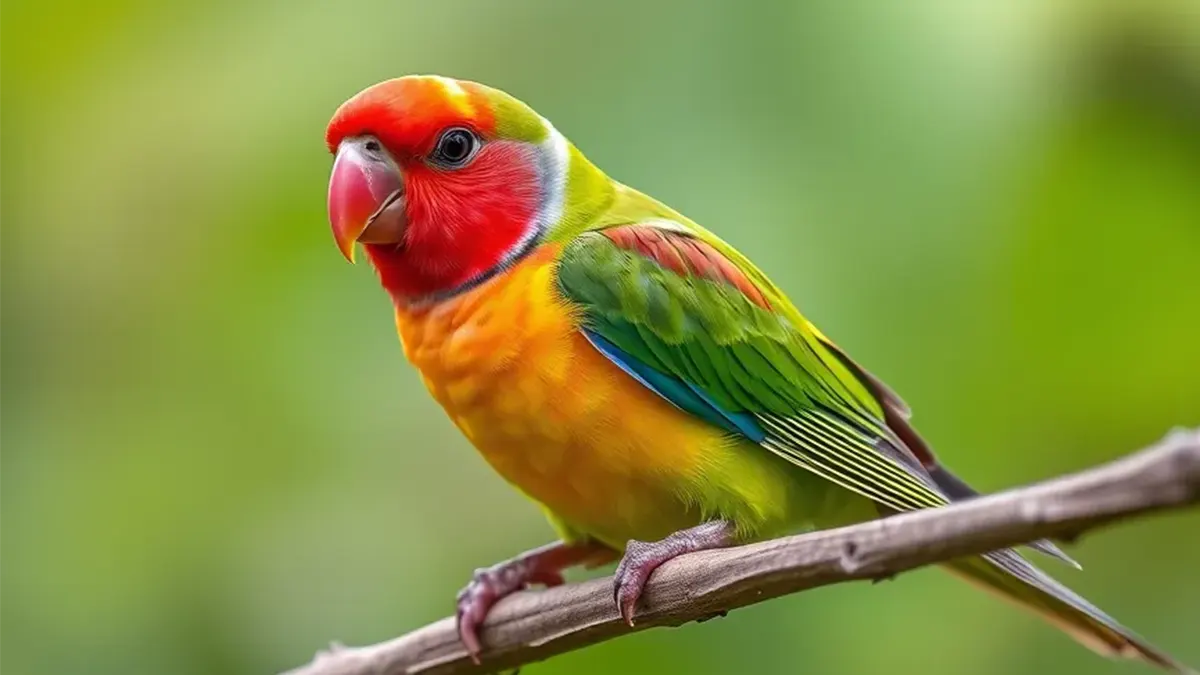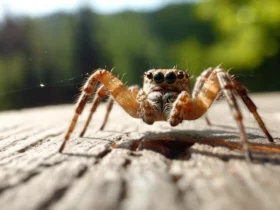The rosy-faced lovebird, also known as the “lovebird” or “pink-faced lovebird,” is one of the most popular pet birds among animal lovers. Renowned for its beauty and charm, as well as its friendly social behavior, this bird makes an ideal companion for many. In this article, we will explore all aspects of the rosy-faced lovebird, from its appearance and social nature to its dietary needs and care requirements.
Table of Contents
Appearance
Colors and Composition
The rosy-faced lovebird boasts a stunning appearance that catches the eye. It is characterized by its striking pink face, which distinguishes this species from other lovebirds. Its plumage ranges from green to yellow, giving it one of the most beautiful appearances among birds. The rosy-faced lovebird typically measures between 13 to 17 cm in length, making it small and suitable for home living.
Physical Characteristics
This lovebird has a strong beak that helps it crack seeds and fruits, as well as sturdy feet for climbing and movement. Its slim, flexible body makes it active and playful. The shiny, vibrant feathers add to its beauty, making it a focal point for anyone who sees it.
Behavior
Social Nature
The rosy-faced lovebird is inherently social, meaning it prefers to live in pairs or groups. This bird loves to interact continuously with humans and other birds, requiring daily engagement to feel happy. When deprived of companionship, it can become anxious or depressed.
Playfulness and Interaction
The rosy-faced lovebird needs mental and physical stimulation, so providing a variety of toys is essential. Wooden or rope toys, along with puzzle games, can keep it entertained and help develop its mental skills.
Communication
Rosy-faced lovebirds communicate through sounds and body language. They can produce soft, melodious sounds and are known to mimic human voices if trained. Their body language, such as wing positioning or head tilting, reflects their mood, and understanding these signals can enhance the relationship between the bird and its owner.
Dietary Needs
Balanced Diet
Caring for a rosy-faced lovebird requires a balanced diet, which should include:
- Bird Seeds: The seeds offered should be specifically formulated for small birds like lovebirds, ensuring a diverse mix to meet their nutritional needs.
- Fruits and Vegetables: Fresh fruits and vegetables should be provided daily. Good options include apples, carrots, and spinach, as these foods are rich in essential vitamins and minerals.
- Nutritional Supplements: Nutritional supplements can be used to ensure the bird receives all the necessary nutrients. Consulting a veterinarian about suitable supplements is recommended.
Water Consumption
Always provide clean, fresh water daily. Change the water regularly to prevent the growth of germs or bacteria. Make sure the drinking vessel is easy to clean and appropriately sized for the bird.
Raising Rosy-faced Lovebirds
Choosing the Right Cage
Selecting an appropriate cage is a crucial step when raising a rosy-faced lovebird. The cage should be spacious enough for the bird to move and fly freely. It is best to choose a cage made from non-toxic materials that are easy to clean. Ensure the bar spacing is suitable to prevent the bird from escaping or getting injured.
Environmental Conditions
The environment in which the rosy-faced lovebird lives is essential for its health and comfort. This bird prefers moderate temperatures ranging from 20 to 25 degrees Celsius. Avoid cold drafts or excessively hot areas exposed to direct sunlight. Providing ample space for the bird to fly and move is also vital.
Health Care
Health care is extremely important. Regular check-ups should be conducted to ensure the bird is free from diseases. It is advisable to consult a veterinarian who specializes in birds to ensure the bird receives proper care. Health care includes vaccinations and regular check-ups to monitor its health status.
Challenges of Raising Rosy-faced Lovebirds
Potential Loss
Like any other pet, raising a rosy-faced lovebird comes with its challenges. The bird may become injured or ill, requiring prompt care and appropriate treatment. Be prepared to face these challenges and provide necessary care in a timely manner.
Time and Commitment
Caring for a rosy-faced lovebird requires time and attention. This bird needs daily interaction and ongoing care. If you are often busy or unable to devote enough time to it, you may want to reconsider the idea of getting a lovebird.
Conclusion
The rosy-faced lovebird is a beautiful and affectionate bird that can be a wonderful companion in your life. By providing the right care and a balanced diet, you can enjoy its presence in your home for many years. If you’re considering adding a rosy-faced lovebird to your family, be ready to offer the love and attention it needs to be happy and healthy.
Always remember that a rosy-faced lovebird is not just a pet but a companion that brings joy and fun. Enjoy your experience with this delightful bird, as it adds happiness to everyone around it!








